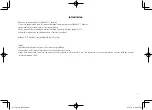
NHL-10
CCS Technical Documentation
Baseband Troubleshooting
34
COMPANY CONFIDENTIAL
ISSUE 2 01/2004
Copyright © 2003 Nokia. All Rights Reserved.
Camera Module Troubleshooting
A fault associated to camera operation can be roughly categorized to three subgroups:
1 Camera is not functional at all, no image can be obtained.
2 Images can be taken but there is nothing recognizable in them.
3 Images can be taken and they are recognizable but for some reason the quality of
images is seriously degraded.
Type 1 and 2 faults are most often similar to what traditionally has been found in any electronic
devices. Type 3 faults are new to NMP and maybe the most challenging to find and verify.
The image quality is very hard to measure quantitatively, and even comparative measurements
are difficult (comparing two images) if the difference is small. Especially, if the user is not sat-
isfied with his/her devices’ image quality, and tells e.g. that the images are not sharp, it is very
difficult to test the device and get an exact figure which then would tell if the device is OK or not.
Most often, subjective evaluation has to be used for finding out if a certain property of the cam-
era is acceptable or not. Some training and a correctly operating reference device maybe need-
ed in order to detect what actually is wrong, or is there anything wrong at all. It is easy for the
user to take bad looking images in bad conditions; thus the camera operation has to be
checked always in constant conditions (lighting, temperature) or by using a second, known to
be good device as a reference. Experience significantly helps in analysing image quality.
Terms
Dynamic range:
camera’s ability to capture details in dark and bright areas of the scene simul-
taneously.
Exposure time:
camera modules use silicon sensor to collect light and for forming an image.
The imaging process roughly corresponds to traditional film photography, in which exposure
time means the time during which the film is exposed to the light coming through optics. In-
creasing the time will allow for more light hitting the film and thus results in brighter image. The
operation principle is exactly the same with silicon sensor, but the shutter functionality is han-
dled electronically i.e. there is no mechanical moving parts like in film cameras.
Flicker: A
phenomena, which is caused by pulsating in scene lighting, typically appearing as
wide horizontal stripes in image.
Noise:
Variation of response between pixels with the same level of input illumination. See e.g.
Figure 29: Noisy image taken in +70 deg, for an example of a noisy image.
Image taking condition effect on image quality
This chapter lists some of the factors, which may cause poor image quality if not taken into ac-
count, and thus result in complaints from customers.
Several issues affect the image quality and will need to be taken into account when shooting
pictures. The listed items are normal to camera operation:
Distance to target:
The lens in the module is specified to operate satisfactorily from 30 cm to infinite distance of
















































